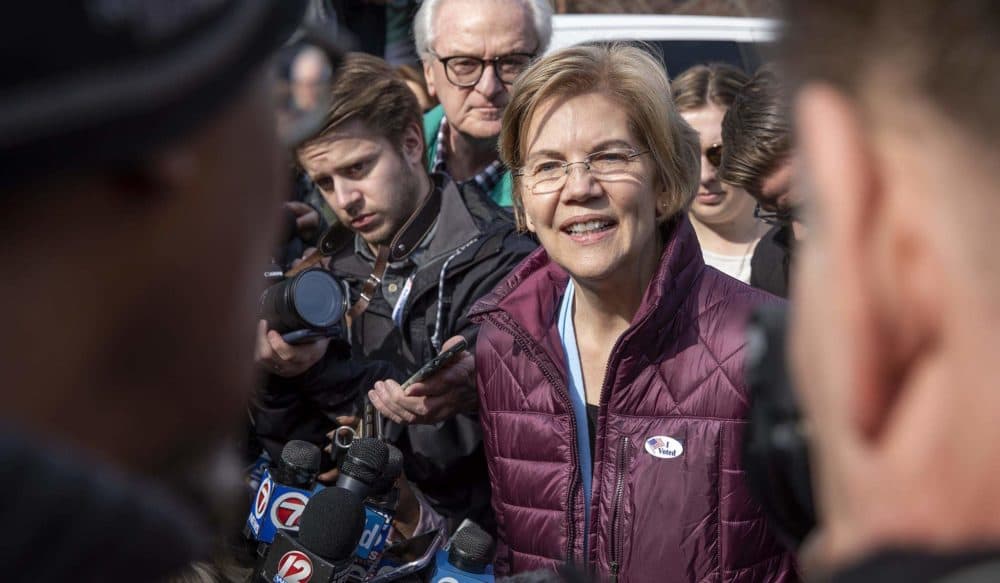Advertisement
Sen. Elizabeth Warren On The Mass. Vaccine Rollout, The Minimum Wage And More

Sen. Elizabeth Warren has criticized the vaccination rollout in Massachusetts, saying Gov. Charlie Baker should move to a one-stop registration system to help residents book an inoculation.
"Why not make it easier for people? And then people know, 'OK, my appointment is next Tuesday, I can go,' or 'Mine's a week from Thursday and I can go,' " Warren said. "This idea of [filtering] these things down through multiple levels leaves a lot of folks behind and just ups everybody's degree of anxiety over this. There's just no point in it. Let's have a better rollout. We're Massachusetts!"
Speaking with WBUR's Radio Boston Wednesday, Warren said Baker made the right call in making more vulnerable people, like the homeless, part of the earlier phases of the vaccine rollout. But she said that decision should not have led to a slower rollout then most other states.
"You know, it's possible to do both, to reach hard to reach communities and to set up centers where those vaccines are going out the door and going out the door as fast as people can line up for them. And that's what we need to do," Warren said.
Warren also discussed several other financial-related issues, including her new role on the Senate Finance Committee, increasing the minimum wage, forgiving student loan debt and recent developments around GameStop.
Here are highlights from that conversation:
On the need for raising the federal minimum wage to $15:
"I want to underline we need a $15 an hour minimum wage and one place I've really focused is getting that wage in place right now for essential workers. Think about all the people who are stocking grocery store shelves and making deliveries and mopping floors so that we can keep our health care system working, so that we can keep our food supply chain working, so that we can keep our economy up and running. Those people deserve a living wage and a $15 an hour minimum wage across the board is going to help not only lift millions of families out of poverty, it's also going to help boost our economy overall. So right now, I just want to make clear: I'm going to be putting a big push on for that $15 an hour minimum wage. It's long past time that we should put a wage in place that someone who's out there working full time could actually support themselves and their family."
On whether getting a $15 minimum wage is possible with a divided Senate:
"I understand that we will have a lot of discussions about this as we go forward and nobody gets exactly the big combined bill that they want. They're going to be things I want that I'm not going to get. There are going to be things other people want that they don't get. But I'll tell you this: I'm in this fight to defend a $15 an hour minimum wage. It is the right thing to do for our economy is the right thing to do for our families."
On her new role on the Senate Finance Committee and what that means for her wealth tax proposal:
"You know, the whole idea behind this — let me just tell everyone, in case anyone doesn't know the details of it — is to say that the people who have more than $50 million in assets should pay a two-cent tax on the amount above $50 million. In other words, your first $50 million is free and clear. But the 50-millionth-and-first dollar, you put in two sets and two cents on every dollar over that. When you get in to a billion dollars in assets, you put a few pennies more than that in. Frankly, it's just like a property tax that every homeowner pays — and frankly, every renter pays indirectly through their rent. Only the difference is for the top one-tenth of 1% in America —the tippy tippy top economically. It says it's not just your real estate taxes, it's also taxes on your stock portfolio, the diamonds, the Rembrandt, the yacht. Paying the property tax that then helps equalize just a little bit and finance opportunity for everyone else in this country."
On the recent GameStop controversy and how to expand investing for individuals in a responsible way:
"I want to see what are called retail investors, right? Folks who want to make investments in the stock market. I want to see them have access to that market, but I want to make sure it's a level playing field. So they shouldn't be in a position, for example, where the hedge funds can come in and play. But if things really heat up, somehow the private individuals get cut out. That's what happened, as you know, in the GameStop case. The market has become far too much a place that is not about bringing capital together so you can invest in businesses. Instead, it's become a place, just a casino, and people come in and gamble. And let's face it, a casino is a place where the insiders, the folks who have that inside track, the big boys, are whatever going to win and everybody else gets left behind."
On forgiving student debt and making college debt-free:
"We must do both. We need to deal with the accumulated debt and we need to make college debt free and we need both of those simultaneously. One of them we can do right now through executive orders, effectively, and that is the president of the United States, his administration, has the power to cancel $50,000 in student loan debt. And that would be the single most effective move the president could make to jumpstart our economy; and the single most effective move the president could make to help close the Black-white wealth gap among the millions of people who have student loan debt; and the single most effective move the president could make to help give young people who are dealing with an economy that has turned against them a real start in life."
On criticism that forgiving student debt is unfair to people who have already paid off their loans:
"There are 43 million people in this country who are dealing with student loan debt right now, 40% of them don't have a college diploma. And they are disproportionately African-American, disproportionately Latino, disproportionately come from families that just couldn't afford to write a check to pay for tuition. There's also an element about this to remember: Cancelling student loan debt [would] be really good for the 43 million Americans who get their student loan debt canceled, or at least a big chunk of it canceled. But it also would be good for everybody who doesn't have student loan debt because of its effect on the economy overall ...
"In the same way that taxes I pay get used to pave roads in South Dakota, even though I haven't driven on any roads in South Dakota recently, we nonetheless make that investment because it's good for our whole economy. Good to have a transportation system that works for everyone. Good to have an education system that works for everyone. And step one in that? Let's cancel out a big chunk of this student loan debt. Let's turn people loose from that and let them get out there and start their businesses and buy homes and save up and build a real future."
This article was originally published on February 17, 2021.
This segment aired on February 17, 2021.

